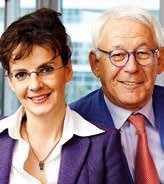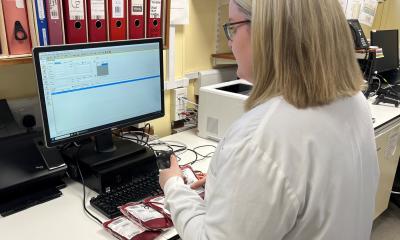Navigating through EU funding jungle
Researchers facing a miasma of application complications need experienced support

The European Union provides huge sums for science and research. The current Seventh Framework Programme for Research and Technical Development (FP7), scheduled to run until 2013, has a total budget of over €54 billion. What do scientists do to secure a piece of the funding cake? Ask Birgit Fuchs, Managing Director of Munich-based GABO:mi. She is considered one of the most successful EU funding application consultants in Germany. At EU level, she says, ‘application procedures are very complex. Preparing an application is a full-time job the researchers usually cannot do on the fly. It takes two to three months to finalise the documents thoroughly and convincingly’. The EU wants to become one of the most dynamic, competitive, knowledge-based economies worldwide. Progress in medicine plays a crucial role in this endeavour. After all, healthcare is considered a key discipline to boost social development and strengthen economic prosperity. Birgit Fuchs expects large consortia to increasingly dominate European research efforts: ‘In Europe, cooperation is the only way to go. As far as research funding is concerned, the trend is towards collaborative research projects with 25 to 30 partners.’ The application consultant helps scientists throughout Europe to acquire EU funding for joint research projects. Over the past five years she and her team successfully applied for and managed projects with a total volume of €200 million. ‘Our application success rate is 70 to 80 percent compared to a usual rate of 10 to 20 percent. Today, on average 10 to 15 institutions participate in the collaborative research projects.’
A homogeneous application
In healthcare, one of the fields in which GABO:mi specialises, applications that focus on personalised medicine, or healthy aging, stand a particularly good chance to receive funding under FP7. ‘These issues remain a major challenge,’ Birgit Fuchs points out, adding, ‘in the past two years personalised medicine has become a huge thing’. Other top issues in healthcare funding are systems medicine, bio-banks and biotechnology. The core competency of GABO:mi business is project management of EU research projects – which means the application is only the first step. ‘In the end, the application has to be of one piece and it has to reflect the actual research process. Later on, only minor deviations are allowed. That is one of the main challenges,’ Birgit Fuchs explains. Years ago, Professor Dieter Schuster, a friend of hers and today her co-managing director, had asked her to help him with the management of a research project. ‘This coincidence inspired our business idea. It had quickly become evident that there is a real gap in the market particularly in view of the fact that collaborative research, which includes several organisations, has long been favoured by the EU,’ Prof. Schuster, an engineer by training, recalls. Together, in 2005, they founded GABO:mi, a spin-off from IT service provider GABO. Today 22 project managers are on the team. About 50 percent of the clients come from Germany, 25 percent from the UK and the remainder from various European countries.
Success-based compensation
To prepare the application the Fuchs’ team advises the researchers, coordinates the initial steps, fine-tunes the application text and ensures all national idiosyncrasies are taken into account and all deadlines met. This frees up time for the scientists to concentrate on their core competency – science – and to contribute the scientific content of the application. When it has been approved and funding secured, GABO:mi manages the project. This is above all people management: promoting communication between the parties, ensuring compliance with all national and European regulations, and facilitating any emerging crises. ‘It does happen that project partners go off board, for example when they change jobs or, particularly with small start-ups, when they shift their focus or fail. Then it’s our task to work with the major actors to come up with sustainable solutions,’ Birgit Fuchs explains. Establishing communication patterns is a core project management instrument to make sure that the information flow is smooth across all levels. A proprietary web-based platform and regular telephone conferences facilitate this process, but even more important are meticulously planned personal meetings. The stunning aspect of the GABO:mi business concept: the consultancy is compensated for their services only when funding has been granted. ‘Money changes hands only if the application has been approved,’ she points out. Only the actual project management fee, a funding line item, finances the firm. Approximately seven percent of the funding total is earmarked for this task. ‘This concept,’ she points out, ‘means we carry a high risk. Therefore we only take on projects we believe in.’
After studying business information systems, in 1992 Birgit Fuchs became a project manager at IT consultancy and software developer GABO mbH & Co. KG. Five years later, she was an officer of the company and co-responsible for key accounts such as Deutsche Telekom AG and Siemens AG. She also headed business development. In 2004, the division Management of EU Research Projects, established the previous year, became the spin-off company GABO:mi mbH & Co. KG with Birgit Fuchs and Dieter Schuster as managing directors. Today, the Munich-based firm supports about 30 large European collaborative research projects.
02.11.2012





